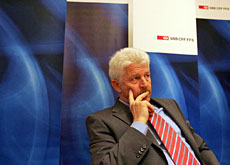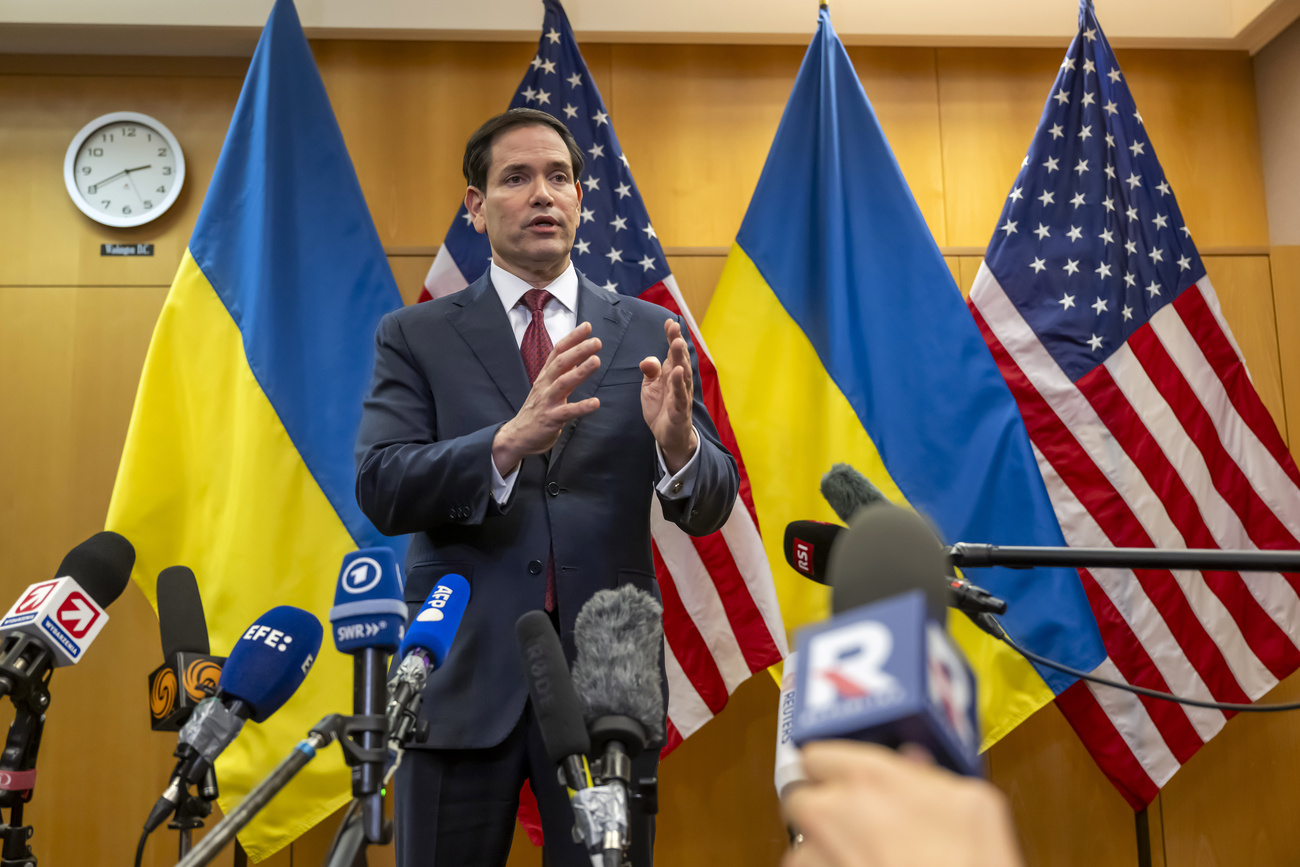
Railways boss prepares to change course

Outgoing Swiss Federal Railways boss Benedikt Weibel says Switzerland has the best railway network in the world.
But in an interview with swissinfo 60-year-old Weibel says there are challenges ahead, notably getting the freight division back on track.
The longest-serving railway chief in Europe, Weibel was named chief executive in 1993. He ends his 28-year association with the railways at the end of the year and will become Switzerland’s official delegate to the Euro 2008 football tournament, which Switzerland is co-hosting with neighbouring Austria.
Despite Weibel’s achievements, his successor, Andreas Meyer, will have a number of issues to tackle. The railways sank into the red last year, while problems remain with the pension scheme and negotiating new labour contracts.
On top of that, Weibel’s recent announcement of further fare increases next year has not gone down well with the public.
swissinfo: How does the Swiss rail network rate in international comparison?
Benedikt Weibel: I think we have the best rail network by far. I know this because I have been head of the International Union of Railways for four years and I know about the networks in other countries.
We have double the density of trains per line kilometre than neighbouring networks and at the same time the best punctuality performance with nearly 96 per cent of Swiss passenger trains arriving within five minutes of schedule.
swissinfo: You have announced another fare increase. Do passengers get value for money?
B.W.: The Italian system is cheaper, but our performance is incomparably better. If we compare with France, Germany and Austria, our prices are not more expensive.
More than two million frequent travellers have half-price cards, so if you travel regularly it is extremely cheap and the price-performance ratio is very good.
I have seen more than ten price increases in my career and the reaction is always the same. I understand that nobody loves it if you increase prices, but I am amazed by the reaction.
swissinfo: The cargo division is being downsized and restructured. Is it possible to get freight back on track?
B.W.: It is a really tough challenge because we have competition from trucks and we have extremely low margins. Switzerland is not a heavily industrialised country and the average distance between destinations is 90 kilometres – which is good for lorries but nothing for rail.
The north-south business – from Germany to Italy – is completely different. There is tough competition between trains and trucks and between companies. We are very well positioned, but on a European scale we are a niche player.
swissinfo: Switzerland has recently installed European standard signalling (ERTMS/ETCS). Will we soon see a harmonised rail system in Europe?
B.W.: Complete system harmonisation will not happen for 30 years or more. This is nothing but a big illusion for the European Union.
ETCS is the poorest project ever led in the European railway landscape. The crazy thing is that there was never a business case for this.
It is much easier to work with different systems and to change the locomotives, and we are proving it. You can never change the electrification of different networks because it is too expensive.
swissinfo: What challenges does your successor face?
B.W.: Firstly, technology. Our oldest signalling box dates back to 1904 and that must work together with modern boxes. Freight will always be an extremely important issue too because it is so hard to break even.
There is also a daily battle for quality and punctuality. Every day we have more than 100 incidents such as technical failures, rolling stock problems, suicides and cars on the line.
The pension deficit is a dossier that will not be resolved totally, but we have a concept to resolve the problem by unlocking SFr1.5 billion ($1.23 billion) from our real estate.
I have two final goals in my remaining weeks: to get a decision from government for our pension fund proposal and find a solution with unions for collective contracts for workers.
swissinfo: What is your role during the Euro 2008 football tournament?
B.W.: As the delegate of our government, I will coordinate everything outside the stadiums that is not football related. This includes security, transportation, marketing, events and hospitality.
It is a bit like the work I have been doing here. I will work with cities and cantons to bring people together. The task is quite simple – to organise 15 football games perfectly around a huge, marvellous, great party.
swissinfo-interview: Matthew Allen
The Swiss railway network spans more than 3,000 kilometres and has one of the highest densities in the world.
The system transported nearly 276 million passengers and more than 56 million tons of freight in 2005.
Swiss Federal Railways posted net group losses of SFr166 million ($136 million) last year, against a SFr43 million profit in 2004.
The group employed 25,943 staff in 2005, a 2.3% decline from the previous year. In October 2005, 650 cargo division job cuts were announced as part of reorganisation measures.
Benedikt Weibel joined the Swiss Federal Railways in 1978 and became its head in 1993 after stints as General Secretary, Director of Passenger Marketing and Director of Operations.
During his tenure he led its transformation from a federally controlled agency into a joint stock company owned by the state.
He has also served as chairman of the Paris-based International Union of Railways (UIC) since 2002. UIC promotes global cooperation between railway operations, tackling such issues as liberalisation of the market and competition from other modes of transport.
Weibel also served as chairman of the International Rail Transport Committee, which looked at legal aspects of rail transport.
The Rail 2000 project was an ambitious joint overhaul of Switzerland’s rail network and timetable, costing SFr5.9 billion ($4.82 billion).
It involved 130 new infrastructure projects around the country and the building of a new line from Mattstetten to Rothrist along the main corridor between Bern and Zurich.
The concept was born in the mid-1980s and took 20 years to plan and execute.
When it was launched in December 2004, there were 12% more trains running on the network. Travelling times on more than half of long-distance journeys were reduced by at least five minutes.

In compliance with the JTI standards
More: SWI swissinfo.ch certified by the Journalism Trust Initiative





























You can find an overview of ongoing debates with our journalists here . Please join us!
If you want to start a conversation about a topic raised in this article or want to report factual errors, email us at english@swissinfo.ch.